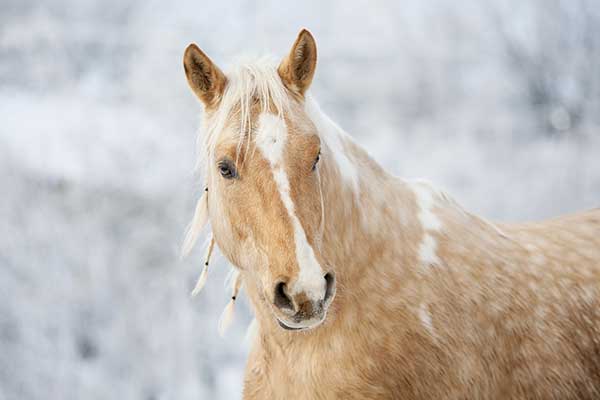
The New Year marks a birthday for many horses. For young horses being older is generally a welcomed thing and usually doesn't require any lifestyle changes, but for the senior horse one more year can be a big deal.
“Things like mobility, body condition, and digestion can really change in twelve months, especially for the super senior horse that is over 21,” says Laurie Cerny, editor of www.equineseniors.com
Cerny recommends that owners honestly assess their senior horses in two main areas: feed requirements and exercise/usability. They should also resolve to embrace moderation in the related assessed outcomes.
“When it comes to feed and supplements you can’t expect your horse will need and/or eat the same way they did at 15- now that they’re older,” she said. “In my experience with our older senior horses they get pickier with their hay. They also tend to sift supplements or NSAIDs (Nonsteroidal anti-inflammatory drug) from their grain rations.”
For this reason, Cerny feeds her super senior horses her most palatable hay. For first cutting this means hay that has been cut earlier and has finer stems, and second cutting that is virtually weed free – both of which reduces waste and ensures it’s being consumed. She also feeds smaller rations several times a day. Depending on body condition, her harder to keep seniors are fed a senior feed, which is also fed in smaller rations 2-3 times a day.
“Because supplements are so expensive (and all of our senior horses are on a good joint and hoof supplement), unless the animal has an insulin issue, I pick one that has molasses or alfalfa added for palatability,” Cerny says.
For owners who are still showing their older senior horses or actively trail riding, objectively looking at what they plan to ask their horses to do in the New Year is key.
“Maybe instead of going on 10- mile trail ride every weekend you might do 2-3 mile rides several times a week. “Older horses, like older people, generally cannot be weekend warriors and then be sound the rest of the week,” Cerny says.
With show horses, this might mean cutting back the number of classes (especially performance classes) shown in a day or weekend. It might also mean going to fewer weekend shows – where you have to haul your horse several hours. Showing closer to home might be a better option because it requires shorter periods of time in the trailer (hauling in general is hard on older horses and especially tough for horses with hock issues).
It’s also good to think about the stress you’ll be putting on an older horse during the upcoming show season.
Cerny, who shows a senior horse, brought her mare home for six days last summer in between two world shows that were held at the same facility. She says, “Everyone asked why I didn’t lay over at the facility. Even though I could have stayed there between shows I felt it was best to let my horse have the time back at home where she could be turned out and has a 12’x 24’ stall to sleep in.”
Later in the season she also decided to not attend a regional show because there was only a couple hour turnaround from when she could haul-in for the show and when the classes started.
Cerny says, “For an older horse rest is crucial when you’ve hauled them a ways. You can’t expect them to come of the trailer and turn around and go in the show pen. They need at least one night to rest, and then to be properly warmed up, if you want them to perform well.”
Finally, the best resolution is to strive for moderation as it’s the secret to keeping an older senior horse in good body condition and sound. Cerny adds, “Keep doing what you did last year with your horse - just moderate it depending on how their mobility and their eating habits have changed.”
See more New Year’s resolutions for the senior horse owner at www.equineseniors.com.
www.equineseniors.com is devoted to the care and competition of equine senior horses. Find more articles and resources on caring for the senior horse, as well as product reviews, at the website.

































